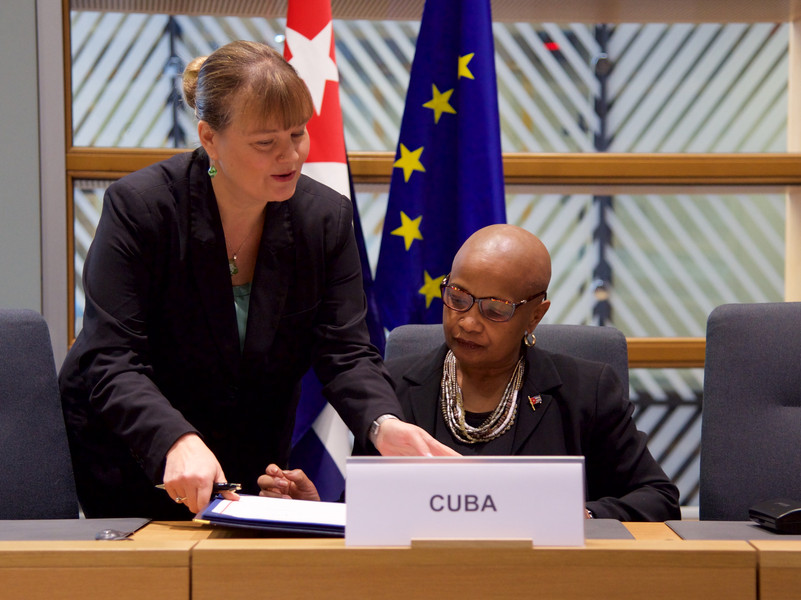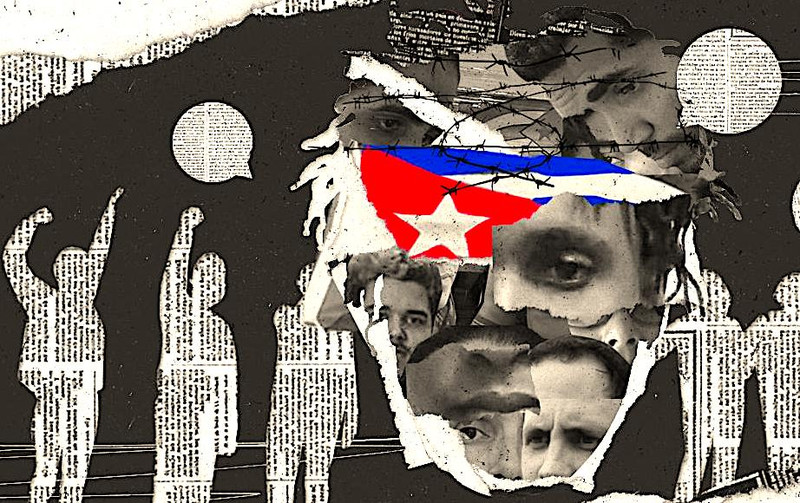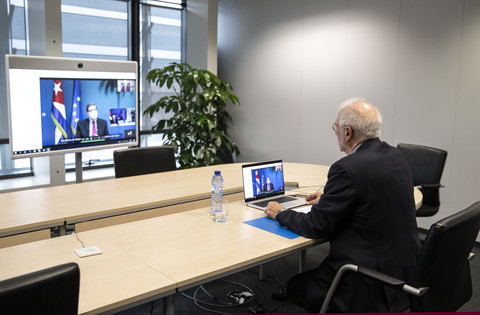[ad_1]
The EU is coaxing US president Joe Biden to open up to Cuba amid its worst economic crisis in decades, but foreign money risks feeding the regime’s “feared” rule.
The EU “rejects” the US trade embargo on Cuba “and we will continue to express this also vis-à-vis the new US administration,” an EU spokesperson told EUobserver on Wednesday (21 January).
She debunked a recent US decision to list Cuba as a terrorist sponsor.
Former US president Donald Trump did it on grounds Cuba hosted members of Colombian insurgent group the National Liberation Army (ELN).
But they were there because of a previous Colombia and EU-backed peace process, which the EU still wanted to “facilitate”, the EU spokesperson said.
“This will only aggravate the already difficult situation of the Cuban people in the midst of the pandemic,” she added.
The US embargo, which Trump also hardened back in 2017, including by blocking remittances, has been in place since 1958.
And what the EU spokesman called Cuba’s “difficult” situation was an economy which shrank by at least 11 percent last year.
“The situation is totally different to the circumstances that we faced during the most critical years of the ‘special period’, when our GDP decreased by 34.8 percent,” Cuba’s ambassador to the EU, Norma Goicochea Estenoz, told EUobserver, referring to the early 1990s, when its economy collapsed.
But Cuba had expected 5m tourists in 2020, while just 1m came due to Covid.
And the US restrictions cost Cuba $5.6bn (€4.6bn) between April 2019 and March 2020, the ambassador said, “provoking great limitations in the response by Cuban authorities to the health and economic crisis”.
It was a “massive, flagrant, and systematic violation” of Cuban people’s “human rights”, she added.
The US sanctions also hit EU firms doing business in Cuba, Goicochea Estenoz noted, naming Spanish tourism operators Blau, Iberostar, and Melia and French drinks-maker Pernod Ricard.
EU support in persuading Biden to overturn Trump’s measures was “very important” for Havana, its envoy said.
And Europe could “help Cuban people” in their hour of need, she said.

EU-Cuba talks
The EU and Cuba spoke out after European foreign affairs chief Josep Borrell and Cuban foreign minister Bruno Rodríguez held video-talks earlier on Wednesday.
For its part, Biden’s administration has kept silent on Cuba, despite his bonfire of other Trump policies in his first days in office.
Meanwhile, ordinary Cubans were, once again, being forced to solicit money from contacts in Europe and further afield.
They were having to queue en masse, including overnight, for basic things, such as bread, rice, and onions.
And the queues posed a coronavirus risk, after previous hygiene rules had managed to keep infections below 20,000 cases, according to the World Health Organisation.
“Havana is very sad. Everything’s closed and there’s nearly no food”, Tina, a 54-year old paediatrician from Darmstadt, in Germany, who recently flew back to Cuba to be with her husband, told EUobserver.
“There’s no meat, no fruits at all” and some people were going “hungry”, she said.
A 7kg sack of rice cost $120 on the black market and a string of onions cost $8, while most Cubans earned $10 to $20 a day, Tina said.
And young people were so desperate that “everybody with two healthy arms and legs” was dreaming of getting out, she said.
The EU has earmarked €11.6m of “fresh money” to help Cuba buy masks, ventilators, and drugs, the EU spokesperson noted.
But amid the humanitarian concerns, the Cuban regime of president Miguel Díaz-Canel also continued to pose a menace to Cuban people’s welfare.
Lower-level EU diplomats have held human-rights “dialogues” with Cuban officials, in which they raised individual cases of abuse.
“We expect Cuba to respect its citizens’ fundamental freedoms and human dignity, also in times of Covid-19,” the EU spokesperson said.
But despite the EU call, Díaz-Canel’s government has recently “taken harsh steps to limit basic rights and freedoms, including artistic and academic freedom, increasingly punishing those who hold alternative views,” Lucia Argüellova, from Czech NGO People in Need, told EUobserver.
“Cuban authorities continue to use arbitrary detentions, inhuman treatment, threats, large fines, and imprisonment … to silence critical voices,” Argüellova, the head of the NGO’s Latin programme, said.

Rights dilemma
And that posed a dilemma for European or American efforts to help.
Cuba’s “highly centralised” system meant foreign income let the regime divert other funds to finance repression, Argüellova said.
And that meant European income could help pay for Cuba’s “feared State Security Department, which focuses on suppressing dissent and so-called ‘ideological subversion’,” the Czech NGO said.
The Cuban EU ambassador said its constitution “guarantees” rights and equality.
“You should understand that we have our own democracy,” Goicochea Estenoz said.
“I’m not saying our democracy is perfect … but you can be sure that we are committed to continue developing our society based on the principles established in our constitution,” she said.
For all that, People in Need’s Argüellova advised EU visitors to the country to take care.
In the past, many EU tourists hardly left big resorts in beach areas such as Varadero, north of Havana, even though some foreign visitors also brought aid to “remote towns”, Argüellova said.
“We cannot expect every tourist to understand the complexity of the situation and empathise with locals,” she noted.
“But for those who want to travel responsibly, we recommend to prioritise services provided by small businesses, often families, such as private accommodation in ‘casas’, over state-run services or large hotels owned by the Cuban military,” Argüellova said.
[ad_2]
Source link
